Canary islands
A traditional holiday destination as an ideal place for mountain and nature photography? I didn't believe so much myself at first. The reality proved me wrong. Just leave the crowded sunny south of Tenerife and the impression changes fundamentally. Even Tenerife itself offers unprecedented diversity in a small piece of land: volcanic desert, fragrant pine forests, jagged cliffs and black beaches, flowering hillsides and vast laurel forests.
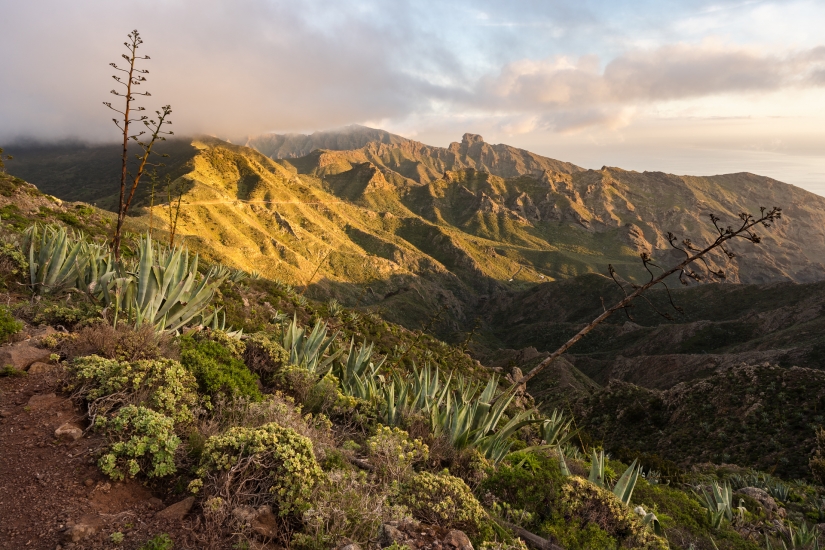
The very top of Baracán is overgrown with tall uninteresting bushes. So during the evening I look for a more interesting composition. I spend a long time around a showy cactus surrounded by tiny purple flowers. But that's still not it. It is only when I come across a group of agaves a few dozen metres below the summit, the only ones far and wide to have retained their blooms through the winter, that everything falls into place. It's one of those rare moments when the future presentation of a photograph is decided immediately, by looking at the camera screen.
Agave
The very top of Baracán is overgrown with tall uninteresting bushes. So during the evening I look for a more interesting composition. I spend a long time around a showy cactus surrounded by tiny purple flowers. But that's still not it. It is only when I come across a group of agaves a few dozen metres below the summit, the only ones far and wide to have retained their blooms through the winter, that everything falls into place. It's one of those rare moments when the future presentation of a photograph is decided immediately, by looking at the camera screen.
- Camera used: SONY ILCE-7C
- Exposure time: 1/15 s
- Aperture: f/11.0
- Focal length: 20mm
- ISO: 100
- Date taken: Mar 11, 2022 19:53:36
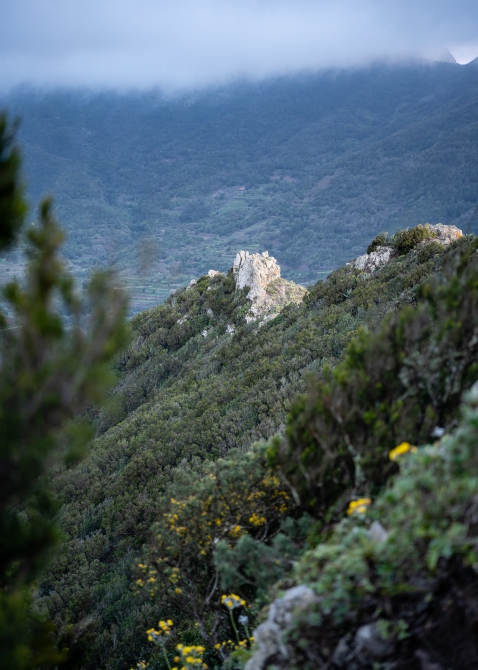
The path to the top of Baracán leads through several smaller or larger white cliffs, somewhat unusually shining in contrast to the rest of the volcanic island. The surrounding vegetated slopes bloom with yellow flowers, contrasting with the bluish light of the cloudy dusk.
Baracán
The path to the top of Baracán leads through several smaller or larger white cliffs, somewhat unusually shining in contrast to the rest of the volcanic island. The surrounding vegetated slopes bloom with yellow flowers, contrasting with the bluish light of the cloudy dusk.
- Camera used: SONY ILCE-7C
- Exposure time: 1/50 s
- Aperture: f/2.8
- Focal length: 90mm
- ISO: 400
- Date taken: Mar 11, 2022 20:13:46
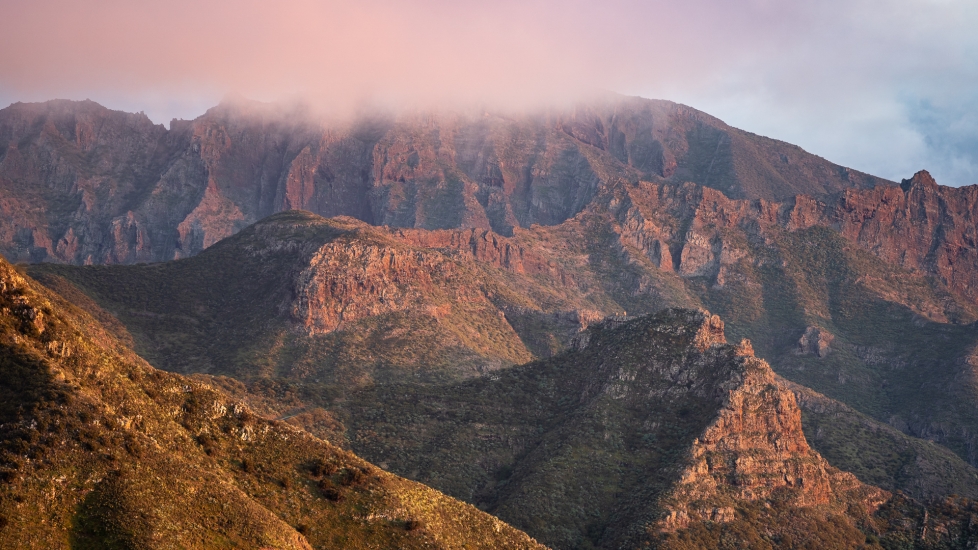
The golden yellow light shines all evening, complementing the green tones of the Teno Mountains. In the brief moments around sunset, when glow of the sun fades and turns pink, I feel that the scene is losing contrast and the best light is gone. Eventually, through a crack in the clouds, the last few rays lean against the vertical rock walls and a dreamlike atmosphere engulfs the mountains.
Barranco de Masca
The golden yellow light shines all evening, complementing the green tones of the Teno Mountains. In the brief moments around sunset, when glow of the sun fades and turns pink, I feel that the scene is losing contrast and the best light is gone. Eventually, through a crack in the clouds, the last few rays lean against the vertical rock walls and a dreamlike atmosphere engulfs the mountains.
- Camera used: SONY ILCE-7C
- Exposure time: 1/80 s
- Aperture: f/2.8
- Focal length: 90mm
- ISO: 100
- Date taken: Mar 11, 2022 20:08:06
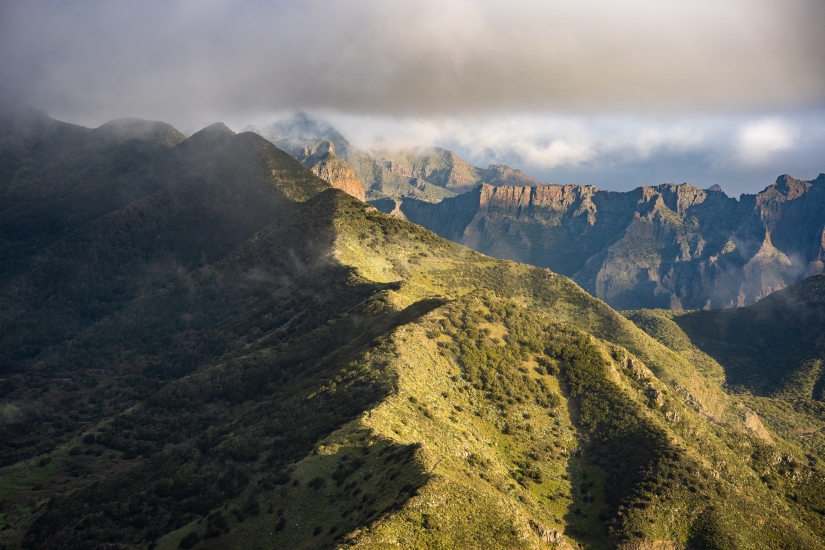
When the clouds start to break over the island, the views from the top of Baracán are sure to be breathtaking. It doesn't matter when the clouds cover the highest point of Teide, the most beautiful views are in the Teno mountains towards the Barranco de Masca gorge. The wind blows so fast that the cloud formations change in seconds, sometimes shrouding distant rock faces, other times revealing cliffs illuminated by the yellowing rays of the sun.
Coastal mountains
When the clouds start to break over the island, the views from the top of Baracán are sure to be breathtaking. It doesn't matter when the clouds cover the highest point of Teide, the most beautiful views are in the Teno mountains towards the Barranco de Masca gorge. The wind blows so fast that the cloud formations change in seconds, sometimes shrouding distant rock faces, other times revealing cliffs illuminated by the yellowing rays of the sun.
- Camera used: SONY ILCE-7C
- Exposure time: 1/160 s
- Aperture: f/8.0
- Focal length: 90mm
- ISO: 100
- Date taken: Mar 11, 2022 19:23:26
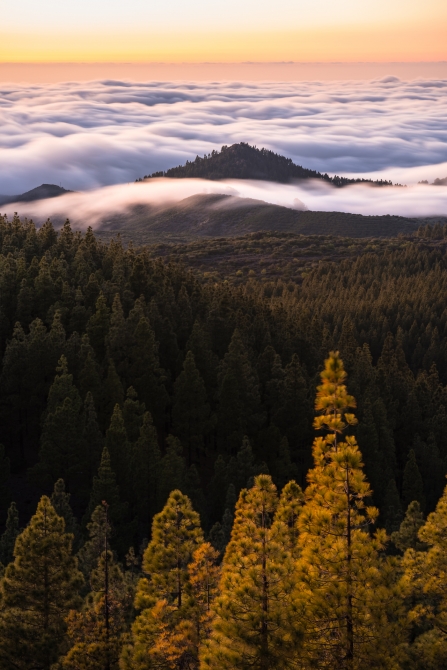
Low clouds in the evening can be relied upon on the Canary islands. The wind drives the clouds over the edge of the Teno Mountains and further to the ocean, where they slowly dissipate again. Shortly after sunset, when there is still plenty of light, the horizon and landscape turn a muted golden light. It is at this sight that the idea of heading to the Teno Mountains for the following sunset matures.
Montaña Tomaseche
Low clouds in the evening can be relied upon on the Canary islands. The wind drives the clouds over the edge of the Teno Mountains and further to the ocean, where they slowly dissipate again. Shortly after sunset, when there is still plenty of light, the horizon and landscape turn a muted golden light. It is at this sight that the idea of heading to the Teno Mountains for the following sunset matures.
- Camera used: SONY ILCE-7C
- Exposure time: 6/1 s
- Aperture: f/8.0
- Focal length: 90mm
- ISO: 100
- Date taken: Mar 10, 2022 20:31:32
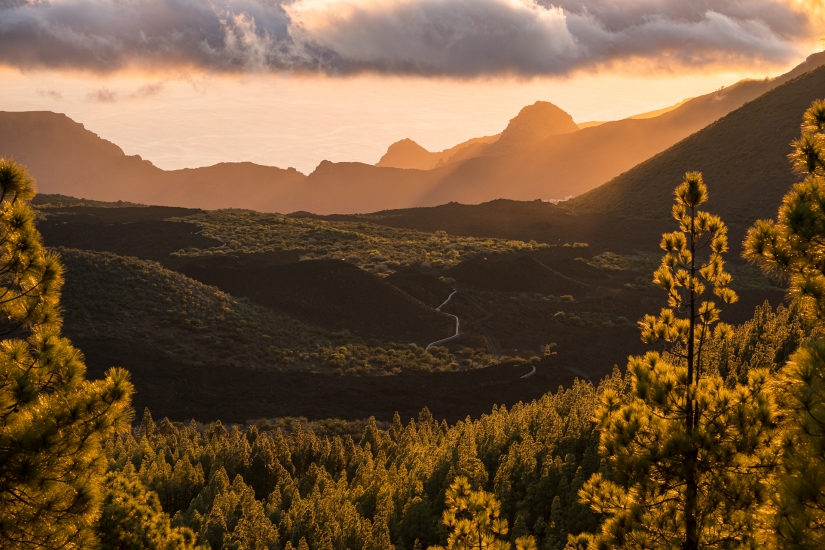
While the summit of neighbouring Chinyero is inaccessible, a comfortable forest path leads to Montana de la Cruz. The pine trees here do not grow singly, but form a dense forest. It is all the more pleasing to discover that there are still several views of Teide, but mainly of the coast and the Teno mountains. The evening atmosphere is traditionally complemented by low clouds.
Montana de la Cruz
While the summit of neighbouring Chinyero is inaccessible, a comfortable forest path leads to Montana de la Cruz. The pine trees here do not grow singly, but form a dense forest. It is all the more pleasing to discover that there are still several views of Teide, but mainly of the coast and the Teno mountains. The evening atmosphere is traditionally complemented by low clouds.
- Camera used: SONY ILCE-7C
- Exposure time: 1/50 s
- Aperture: f/8.0
- Focal length: 90mm
- ISO: 100
- Date taken: Mar 10, 2022 20:04:25
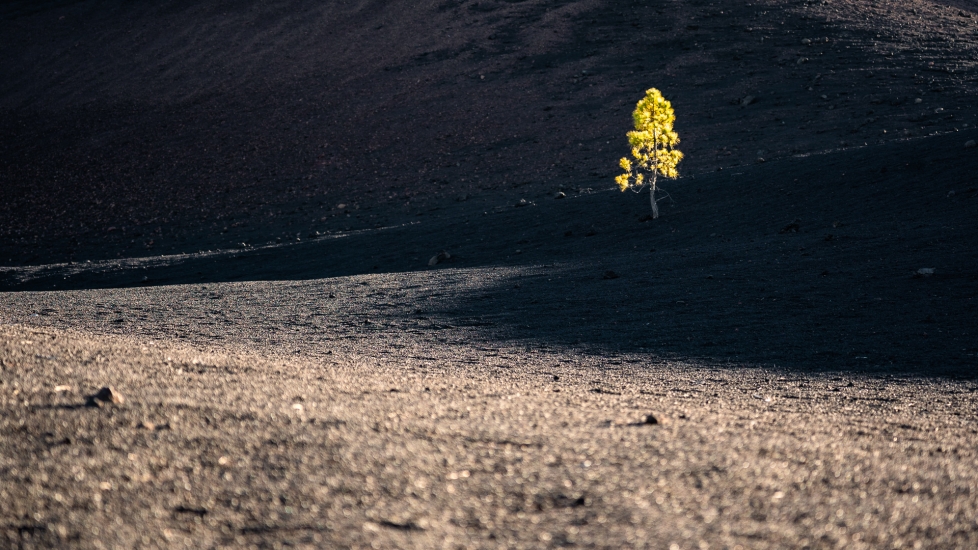
Dark volcanic sands around Chinyero volcano. Only occasionally is the black emptiness broken by a lone yellowish pine, fearlessly struggling to life. I can't get enough of the details here, the volcanic landscape invites me to minimalist compositions. I am most taken with this tiny tree with its sunlit crown otherwise completely immersed in shade.
Volcanic solitude
Dark volcanic sands around Chinyero volcano. Only occasionally is the black emptiness broken by a lone yellowish pine, fearlessly struggling to life. I can't get enough of the details here, the volcanic landscape invites me to minimalist compositions. I am most taken with this tiny tree with its sunlit crown otherwise completely immersed in shade.
- Camera used: SONY ILCE-7C
- Exposure time: 1/640 s
- Aperture: f/2.8
- Focal length: 90mm
- ISO: 100
- Date taken: Mar 10, 2022 18:58:52
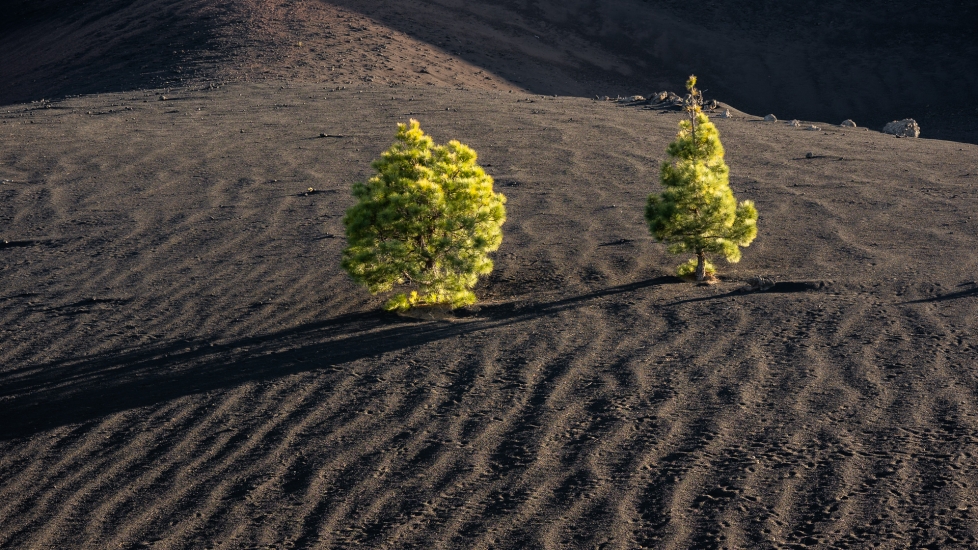
The sun leans towards the horizon, stretching its shadows to unprecedented lengths in the volcanic landscape. This detail with the two pine trees growing out of the tiny, wind-blown volcanic dune catches my eye. The smell of pine trees is everywhere here, and I only have to walk a little further to be engulfed by the dense forest again.
Volcanic waves
The sun leans towards the horizon, stretching its shadows to unprecedented lengths in the volcanic landscape. This detail with the two pine trees growing out of the tiny, wind-blown volcanic dune catches my eye. The smell of pine trees is everywhere here, and I only have to walk a little further to be engulfed by the dense forest again.
- Camera used: SONY ILCE-7C
- Exposure time: 1/80 s
- Aperture: f/8.0
- Focal length: 90mm
- ISO: 100
- Date taken: Mar 10, 2022 19:02:35
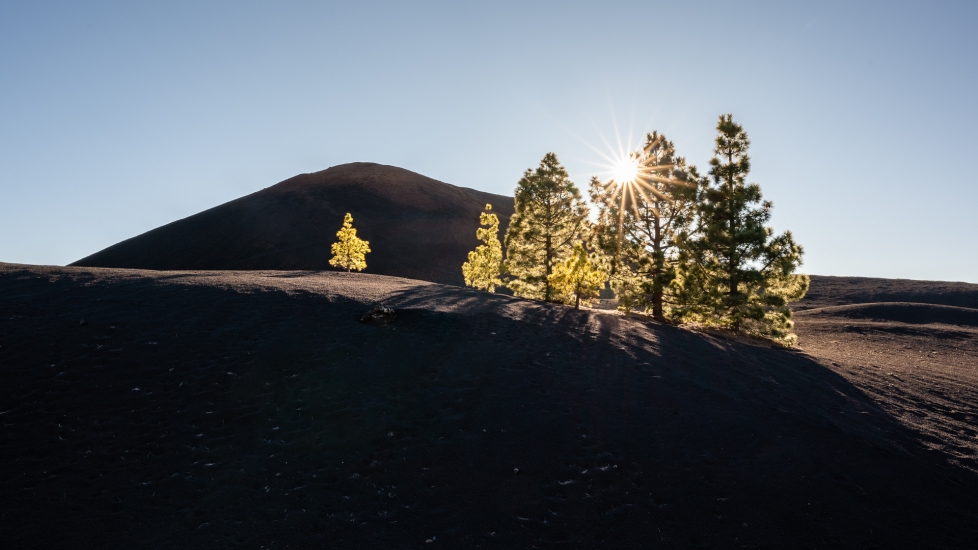
Tenerife's volcanic landscape shapes in the most bizarre form and colours around the Chinyero volcano. Here, pine forests give way to black-brown plains, perhaps the darkest to be found here. Plains of fine sand give way at times to lava fields of sharp tuff boulders and rocks, all dominated by the rounded peak of Chinyero. From time to time, a lone pine tree or a grove of pine trees adds to the picturesque landscape.
Chinyero
Tenerife's volcanic landscape shapes in the most bizarre form and colours around the Chinyero volcano. Here, pine forests give way to black-brown plains, perhaps the darkest to be found here. Plains of fine sand give way at times to lava fields of sharp tuff boulders and rocks, all dominated by the rounded peak of Chinyero. From time to time, a lone pine tree or a grove of pine trees adds to the picturesque landscape.
- Camera used: SONY ILCE-7C
- Exposure time: 1/50 s
- Aperture: f/14.0
- Focal length: 20mm
- ISO: 100
- Date taken: Mar 10, 2022 18:55:59

The highest peak in Spain, Teide, is visible from every corner of Tenerife. The best views, however, are just above the tree line, where you can see the entire 3,718 meters of difference in altitude from sea level to the summit. At the same time, there is a high probability that the clouds will remain deep down as they do here over the town of La Orotava. Sunrise is just the icing on the cake.
Teide
The highest peak in Spain, Teide, is visible from every corner of Tenerife. The best views, however, are just above the tree line, where you can see the entire 3,718 meters of difference in altitude from sea level to the summit. At the same time, there is a high probability that the clouds will remain deep down as they do here over the town of La Orotava. Sunrise is just the icing on the cake.
- Camera used: SONY ILCE-7C
- Exposure time: 1/20 s
- Aperture: f/11.0
- Focal length: 20mm
- ISO: 100
- Date taken: Mar 10, 2022 08:27:54
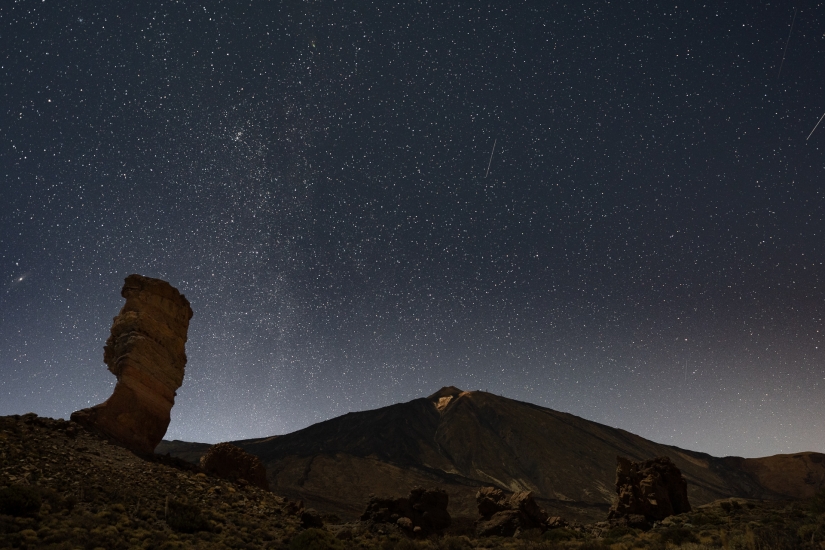
My planned night sky photography is sabotaged by the moon shining in the southern half of the sky. Here on the islands, far from the glowing mainland, there may not even be a half-full moon, and yet its glow in the night sky is blinding. So I opt for at least a basic composition towards the north, with Teide and the Roque Cinchado rock formation.
Stars over Teide
My planned night sky photography is sabotaged by the moon shining in the southern half of the sky. Here on the islands, far from the glowing mainland, there may not even be a half-full moon, and yet its glow in the night sky is blinding. So I opt for at least a basic composition towards the north, with Teide and the Roque Cinchado rock formation.
- Camera used: SONY ILCE-7C
- Exposure time: 15/1 s
- Aperture: f/2.2
- Focal length: 20mm
- ISO: 1600
- Date taken: Mar 9, 2022 21:14:14
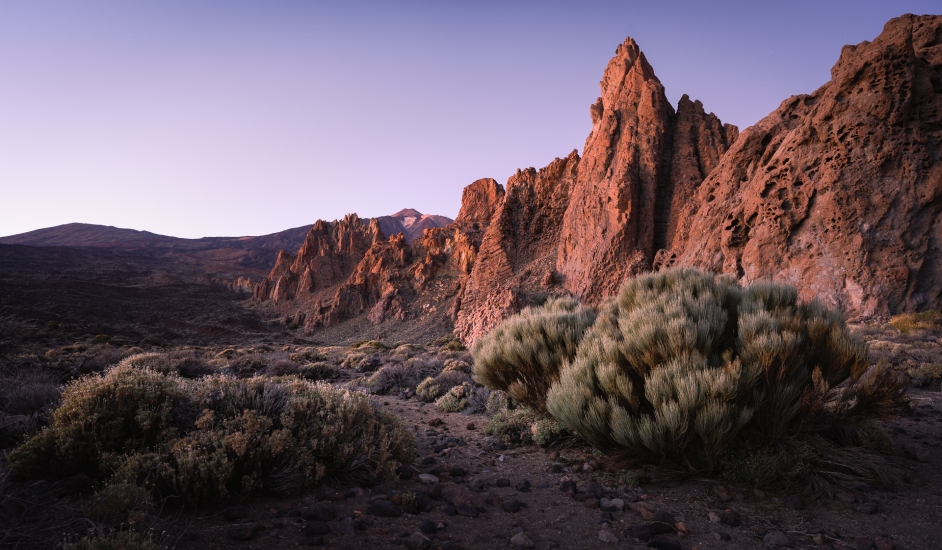
Darkness falls quickly in the rock desert, but the orange rocks still reflect the residual light long after the sun has set. The first stars and the moon are rising, making it possible to move around without light for a while. The evening is calm, there is no wind, the landscape still glows with the heat of the day, but the air cools quickly.
Arrival of night at Roques de García
Darkness falls quickly in the rock desert, but the orange rocks still reflect the residual light long after the sun has set. The first stars and the moon are rising, making it possible to move around without light for a while. The evening is calm, there is no wind, the landscape still glows with the heat of the day, but the air cools quickly.
- Camera used: SONY ILCE-7C
- Exposure time: 13/1 s
- Aperture: f/5.6
- Focal length: 20mm
- ISO: 100
- Date taken: Mar 9, 2022 20:35:45
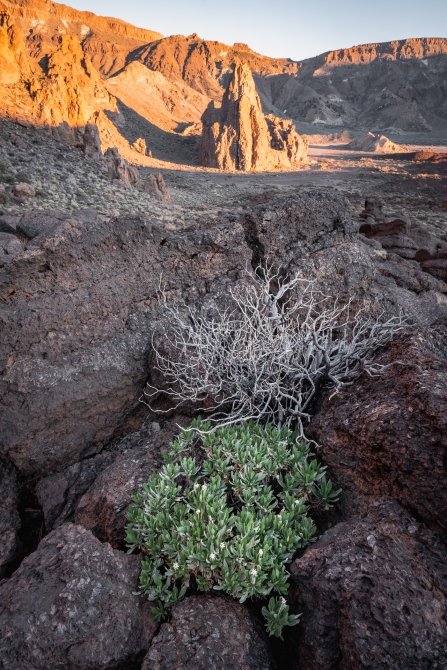
The sun sinks lower behind the edge of the caldera, illuminating only the rocks at the lower edge of Roques de García. Away from the main group of rocks, the largest monolith, La Catedral, stands proudly. Fascinated from the first moment I laid eyes on it, I spend the whole afternoon in sight of it, and when evening approaches I return to the spot with prepared composition.
La Catedral
The sun sinks lower behind the edge of the caldera, illuminating only the rocks at the lower edge of Roques de García. Away from the main group of rocks, the largest monolith, La Catedral, stands proudly. Fascinated from the first moment I laid eyes on it, I spend the whole afternoon in sight of it, and when evening approaches I return to the spot with prepared composition.
- Camera used: SONY ILCE-7C
- Exposure time: 1/10 s
- Aperture: f/11.0
- Focal length: 20mm
- ISO: 100
- Date taken: Mar 9, 2022 19:53:49
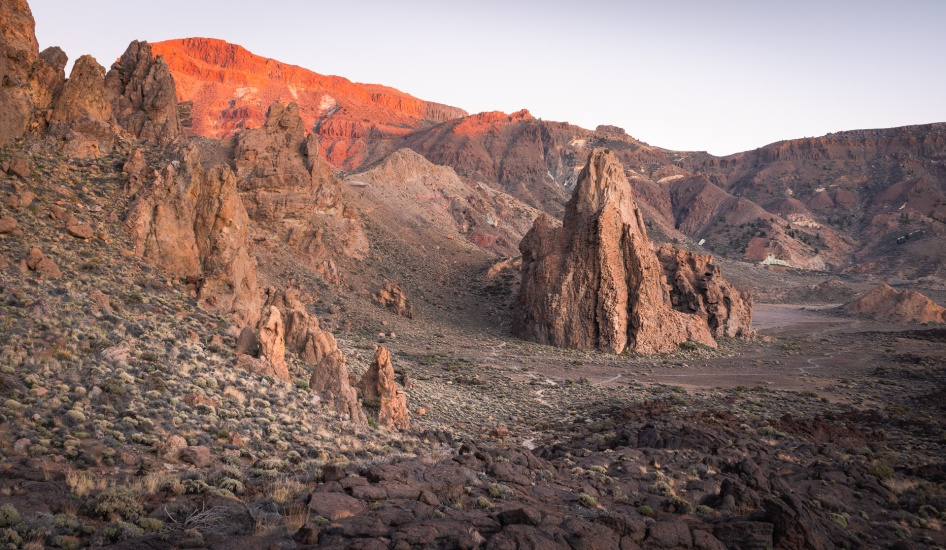
The desert landscape takes on its best colours just before sunset, for a few fleeting minutes. The shadows rise so quickly that their movement can be perceived with the naked eye. In the end, only the top of Guajara remains directly illuminated, literally engulfed in red light. But rock monoliths, like the largest La Catedral, are perhaps even more beautiful when all the sharp shadows disappear and only the softly diffused afterglow remains.
Volcanic desert
The desert landscape takes on its best colours just before sunset, for a few fleeting minutes. The shadows rise so quickly that their movement can be perceived with the naked eye. In the end, only the top of Guajara remains directly illuminated, literally engulfed in red light. But rock monoliths, like the largest La Catedral, are perhaps even more beautiful when all the sharp shadows disappear and only the softly diffused afterglow remains.
- Camera used: SONY ILCE-7C
- Exposure time: 1/2 s
- Aperture: f/11.0
- Focal length: 32mm
- ISO: 100
- Date taken: Mar 9, 2022 20:11:32

At the very end of the Roques de García rocky formation lies perhaps the craziest place in the whole area. Here, rock pillars and fingers rise out of lava fields oblivious to gravity, and scattered grey pillows of desert scrub grow all around. You need to come here early in the afternoon, while the sun's rays are still hitting the rocks. By evening, the place is already engulfed in shadow
Desert needle
At the very end of the Roques de García rocky formation lies perhaps the craziest place in the whole area. Here, rock pillars and fingers rise out of lava fields oblivious to gravity, and scattered grey pillows of desert scrub grow all around. You need to come here early in the afternoon, while the sun's rays are still hitting the rocks. By evening, the place is already engulfed in shadow
- Camera used: SONY ILCE-7C
- Exposure time: 1/2000 s
- Aperture: f/2.0
- Focal length: 50mm
- ISO: 50
- Date taken: Mar 9, 2022 19:06:25
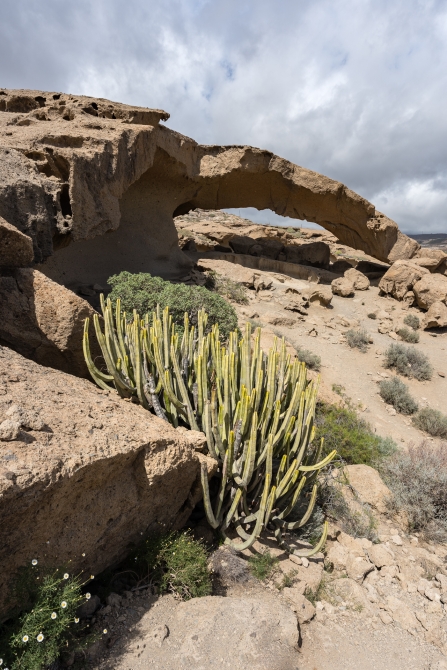
The largest rock arch in Tenerife is located completely out of the way, and in close proximity to the motorway and the wind farm. So I expect practically nothing from this place. In the end I was very pleasantly surprised, the arch arches beautifully over a small desert canyon and is complemented perfectly by a large cactus bush.
Arco de Tajao
The largest rock arch in Tenerife is located completely out of the way, and in close proximity to the motorway and the wind farm. So I expect practically nothing from this place. In the end I was very pleasantly surprised, the arch arches beautifully over a small desert canyon and is complemented perfectly by a large cactus bush.
- Camera used: SONY ILCE-7C
- Exposure time: 1/400 s
- Aperture: f/8.0
- Focal length: 20mm
- ISO: 100
- Date taken: Mar 9, 2022 13:18:10
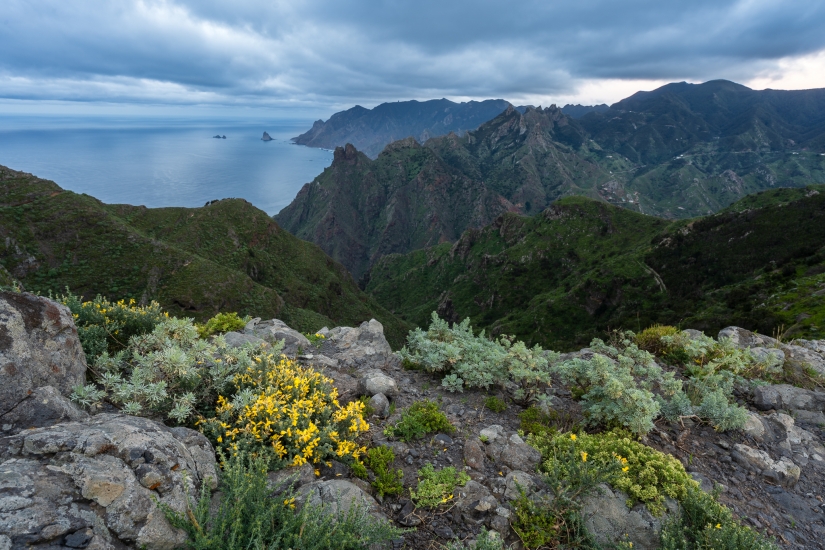
A dusk mood under the Tenerife's own Matterhorn peak - Roque de Taborno. Within moments the landscape loses its golden hue and sinks into cooler blue shades. Just wait a little longer and the first lights will light up in the scattered mountain villages. In another moment, it would be necessary to turn on your headlamp.
Roque de Taborno
A dusk mood under the Tenerife's own Matterhorn peak - Roque de Taborno. Within moments the landscape loses its golden hue and sinks into cooler blue shades. Just wait a little longer and the first lights will light up in the scattered mountain villages. In another moment, it would be necessary to turn on your headlamp.
- Camera used: SONY ILCE-7C
- Exposure time: 2/1 s
- Aperture: f/11.0
- Focal length: 20mm
- ISO: 100
- Date taken: Mar 8, 2022 20:10:30
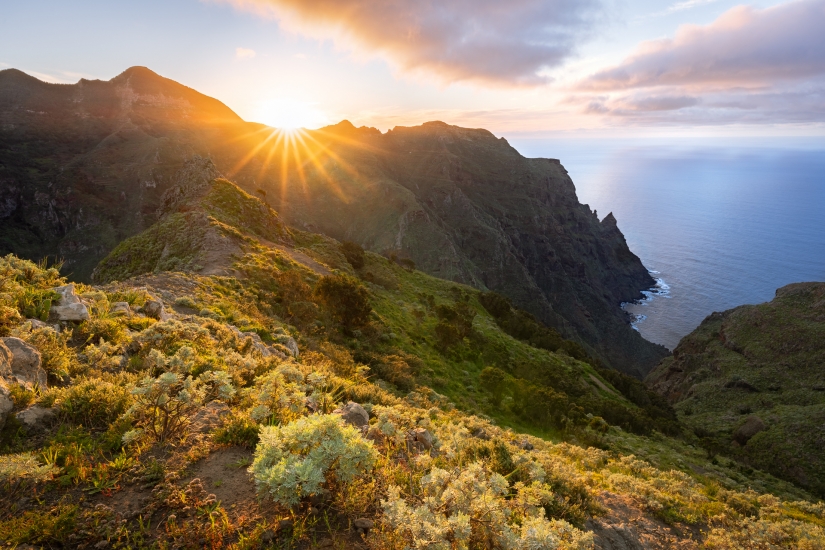
The sun has been dipping so low since early afternoon that the whole valley is filled with a sharp black shadow. Too sharp. But even then I am already preparing the planned composition, still completely cloudless. Lighted shrubs, a hill with a lone tree and a cliff in the background falling sharply into the sea. The sun should set somewhere above it. As the sunset approaches, the first clouds move in from the east and the composition needs to be shifted slightly up.
Peaks rising from the ocean
The sun has been dipping so low since early afternoon that the whole valley is filled with a sharp black shadow. Too sharp. But even then I am already preparing the planned composition, still completely cloudless. Lighted shrubs, a hill with a lone tree and a cliff in the background falling sharply into the sea. The sun should set somewhere above it. As the sunset approaches, the first clouds move in from the east and the composition needs to be shifted slightly up.
- Camera used: SONY ILCE-7C
- Exposure time: 1/50 s
- Aperture: f/11.0
- Focal length: 20mm
- ISO: 100
- Date taken: Mar 8, 2022 19:56:54
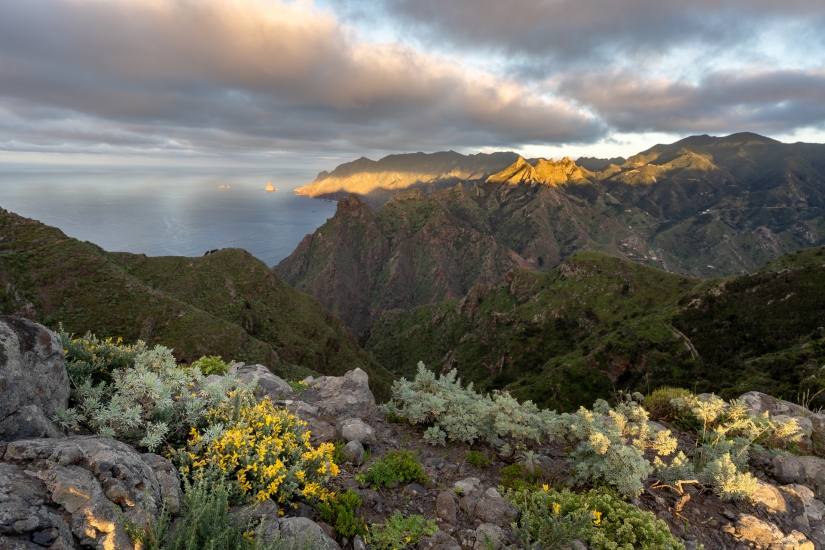
One of the most beautiful views of the Anaga ridges and the jagged coastline is offered by the Roque de Taborno viewpoint. The deep valleys are soon filled with sharp shadows that give little hope for sunlit compositions. Sometimes, however, all it takes is for the glittering sunlight to touch selected peaks and perfect clouds to roll in from the ocean.
Golden Taborno
One of the most beautiful views of the Anaga ridges and the jagged coastline is offered by the Roque de Taborno viewpoint. The deep valleys are soon filled with sharp shadows that give little hope for sunlit compositions. Sometimes, however, all it takes is for the glittering sunlight to touch selected peaks and perfect clouds to roll in from the ocean.
- Camera used: SONY ILCE-7C
- Exposure time: 1/25 s
- Aperture: f/11.0
- Focal length: 20mm
- ISO: 100
- Date taken: Mar 8, 2022 19:49:19
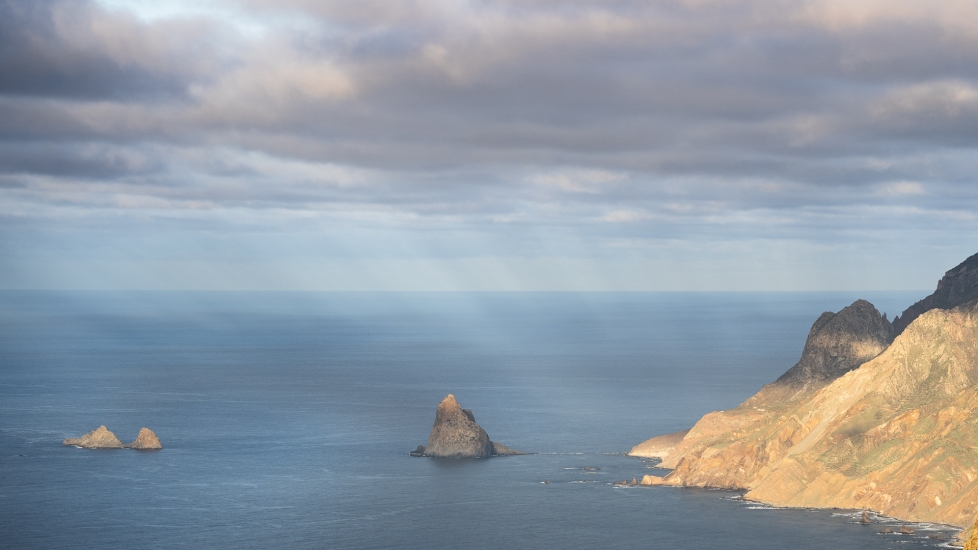
It is late afternoon and the mountain valleys are filled with a not very photogenic dark sharp shadow. But over the sea things are happening! The sun shines through holes in the clouds towards the distant cliffs and the bluish sea surface.
Sunrays over the sea
It is late afternoon and the mountain valleys are filled with a not very photogenic dark sharp shadow. But over the sea things are happening! The sun shines through holes in the clouds towards the distant cliffs and the bluish sea surface.
- Camera used: SONY ILCE-7C
- Exposure time: 1/400 s
- Aperture: f/5.6
- Focal length: 90mm
- ISO: 100
- Date taken: Mar 8, 2022 19:26:29
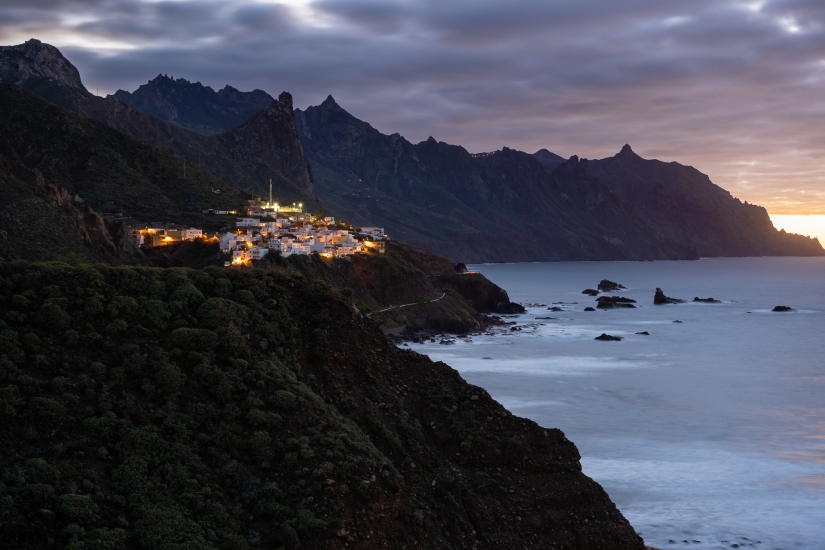
The wind drives the clouds across the island to the ocean and the waves beat relentlessly against the dark cliffs. The landscape quickly plunges into darkness. Only the lights of the village of Almáciga light up to struggle against the encroaching darkness.
Village of Almáciga
The wind drives the clouds across the island to the ocean and the waves beat relentlessly against the dark cliffs. The landscape quickly plunges into darkness. Only the lights of the village of Almáciga light up to struggle against the encroaching darkness.
- Camera used: SONY ILCE-7C
- Exposure time: 10/1 s
- Aperture: f/5.6
- Focal length: 50mm
- ISO: 100
- Date taken: Mar 7, 2022 20:30:47
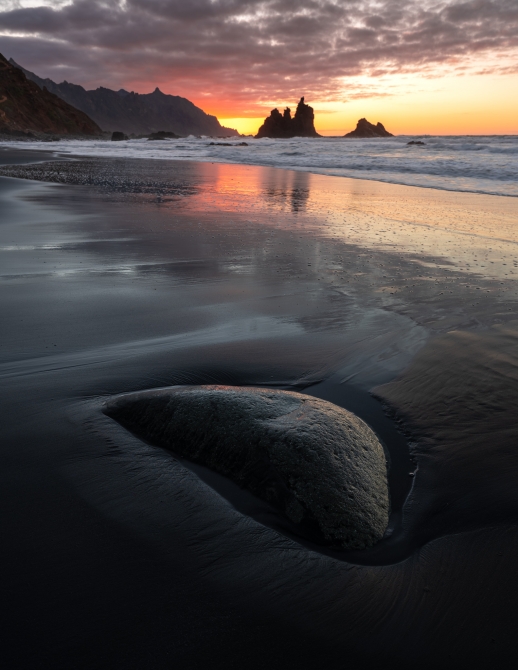
The black colour of the beach and the sharp cliffs alone create an extraordinary spectacle. However, it is the isolated boulders half-rising of the sand that make Benijo Beach completely irresistible. As the sun leans into the thin clouds in its last moments above the horizon, the damp sand mirrors their rich colours.
Playa de Benijo
The black colour of the beach and the sharp cliffs alone create an extraordinary spectacle. However, it is the isolated boulders half-rising of the sand that make Benijo Beach completely irresistible. As the sun leans into the thin clouds in its last moments above the horizon, the damp sand mirrors their rich colours.
- Camera used: SONY ILCE-7C
- Exposure time: 1/13 s
- Aperture: f/8.0
- Focal length: 20mm
- ISO: 50
- Date taken: Mar 7, 2022 20:04:15
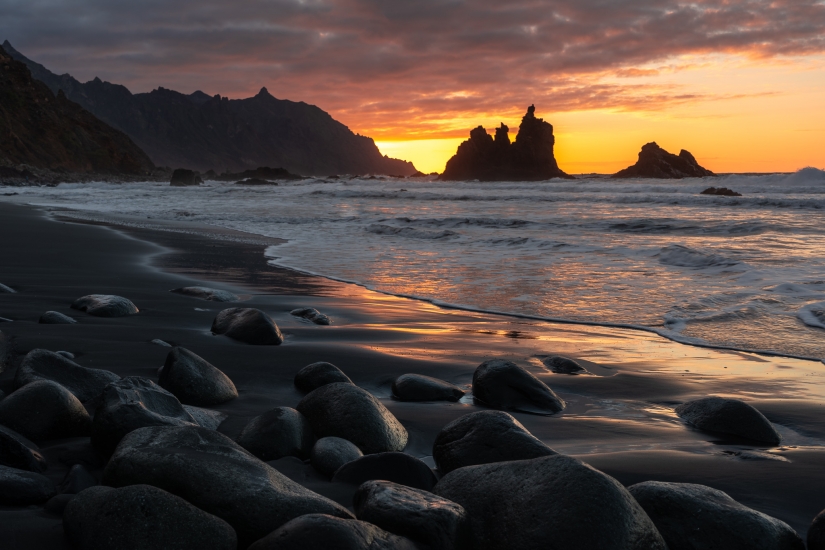
The sun sets behind the cliff around Roque de Taborno, leaving the black beach drowned in shadow. But the soft light reflects off the dark boulders and the smooth structures in the sand. The structures change slightly with each sea wave, and with them the intensity of the orange reflections. We just have to wait for the perfect moment.
Black sand beach
The sun sets behind the cliff around Roque de Taborno, leaving the black beach drowned in shadow. But the soft light reflects off the dark boulders and the smooth structures in the sand. The structures change slightly with each sea wave, and with them the intensity of the orange reflections. We just have to wait for the perfect moment.
- Camera used: SONY ILCE-7C
- Exposure time: 1/40 s
- Aperture: f/8.0
- Focal length: 41mm
- ISO: 50
- Date taken: Mar 7, 2022 19:57:22
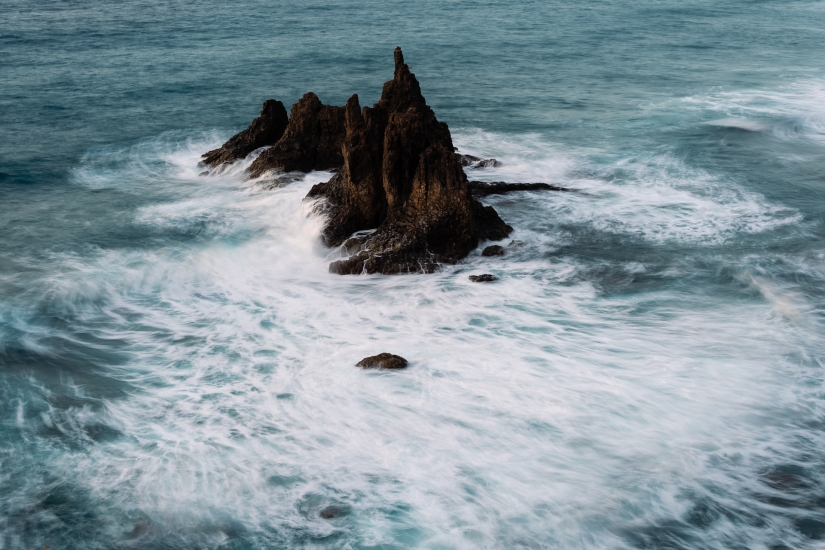
The sea doesn't calm down at dusk, quite the opposite. The wind blows the waves that crash against every reef in their path. Again, again and again. The scorching land radiates heat, the air smells of salt and the sea darkens. Long into the evening, only the white foam of the waves shines.
Against the tide
The sea doesn't calm down at dusk, quite the opposite. The wind blows the waves that crash against every reef in their path. Again, again and again. The scorching land radiates heat, the air smells of salt and the sea darkens. Long into the evening, only the white foam of the waves shines.
- Camera used: SONY ILCE-7C
- Exposure time: 25/10 s
- Aperture: f/5.6
- Focal length: 50mm
- ISO: 100
- Date taken: Mar 7, 2022 20:24:27
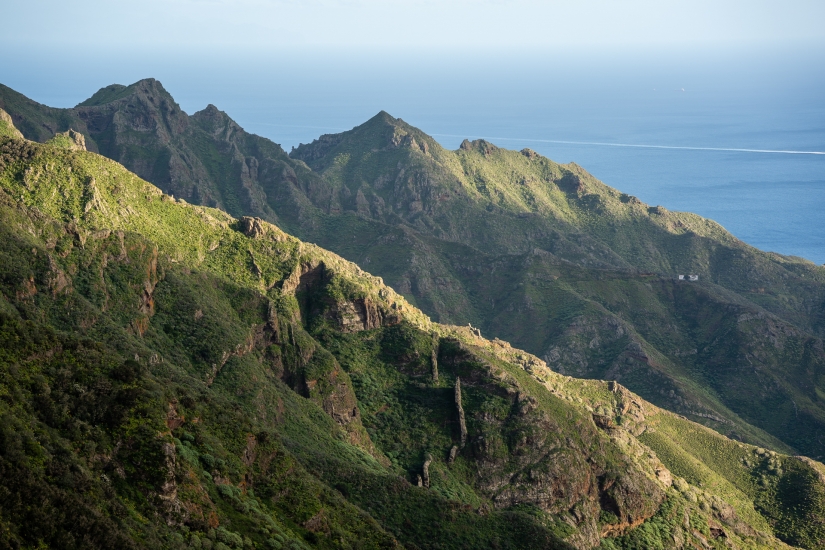
Often, it only takes a moment for the ocean winds to blow the clouds so high that the sun illuminates the green hillsides.
Shadows of Anaga
Often, it only takes a moment for the ocean winds to blow the clouds so high that the sun illuminates the green hillsides.
- Camera used: SONY ILCE-7C
- Exposure time: 1/200 s
- Aperture: f/5.6
- Focal length: 90mm
- ISO: 100
- Date taken: Mar 7, 2022 19:01:59

The steep slopes of the Anaga Mountains are largely covered with dense laurel forests or impenetrable scrub. Any place where the undergrowth spreads out and opens up a view of the landscape is all the more precious. A fresh breeze blows, the air is saturated with salt and the dim light falls on the rocky corner of Roque de Ánimas and the settlement of Almáciga.
Cabezo Del Tejo
The steep slopes of the Anaga Mountains are largely covered with dense laurel forests or impenetrable scrub. Any place where the undergrowth spreads out and opens up a view of the landscape is all the more precious. A fresh breeze blows, the air is saturated with salt and the dim light falls on the rocky corner of Roque de Ánimas and the settlement of Almáciga.
- Camera used: SONY ILCE-7C
- Exposure time: 1/640 s
- Aperture: f/5.6
- Focal length: 90mm
- ISO: 100
- Date taken: Mar 7, 2022 16:52:30
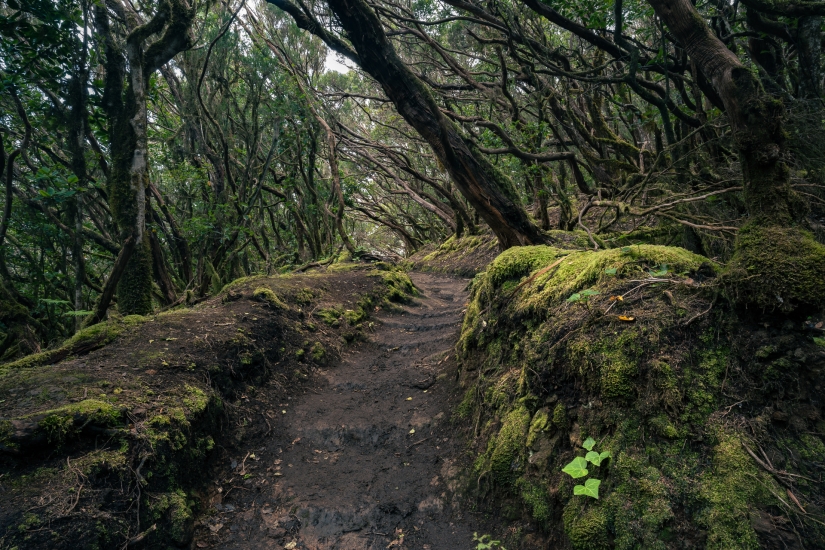
The sun hides behind the clouds, the birds singing ceases. Only the tree branches sway in the never-ceasing wind and rustle noisily. The air even here inside the forest smells of salt. The trail ascends, descends and winds its way further into the forest.
Laurel forests
The sun hides behind the clouds, the birds singing ceases. Only the tree branches sway in the never-ceasing wind and rustle noisily. The air even here inside the forest smells of salt. The trail ascends, descends and winds its way further into the forest.
- Camera used: SONY ILCE-7C
- Exposure time: 2/1 s
- Aperture: f/11.0
- Focal length: 20mm
- ISO: 100
- Date taken: Mar 7, 2022 18:16:48
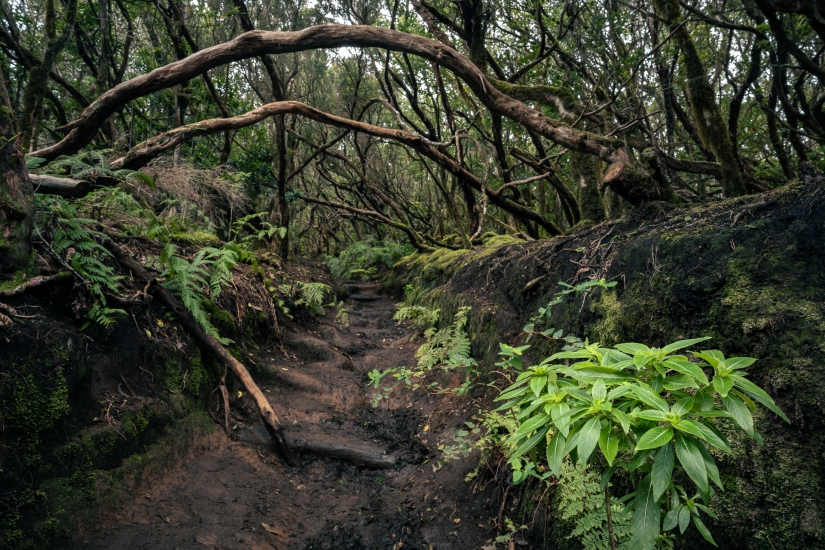
The heart of green Anaga - the El Pijaral laurel forest. Here, twisted laurel trees, lush ferns and flowering herbs struggle to survive under the sharp winds blowing in from the ocean. In bright sunshine, the canopy provides a pleasant shelter from the heat, but the atmosphere is most interesting when the sun hides behind the clouds. The forest darkens and takes on a mysterious, almost gloomy atmosphere.
El Pijaral
The heart of green Anaga - the El Pijaral laurel forest. Here, twisted laurel trees, lush ferns and flowering herbs struggle to survive under the sharp winds blowing in from the ocean. In bright sunshine, the canopy provides a pleasant shelter from the heat, but the atmosphere is most interesting when the sun hides behind the clouds. The forest darkens and takes on a mysterious, almost gloomy atmosphere.
- Camera used: SONY ILCE-7C
- Exposure time: 4/10 s
- Aperture: f/11.0
- Focal length: 20mm
- ISO: 500
- Date taken: Mar 7, 2022 18:15:41
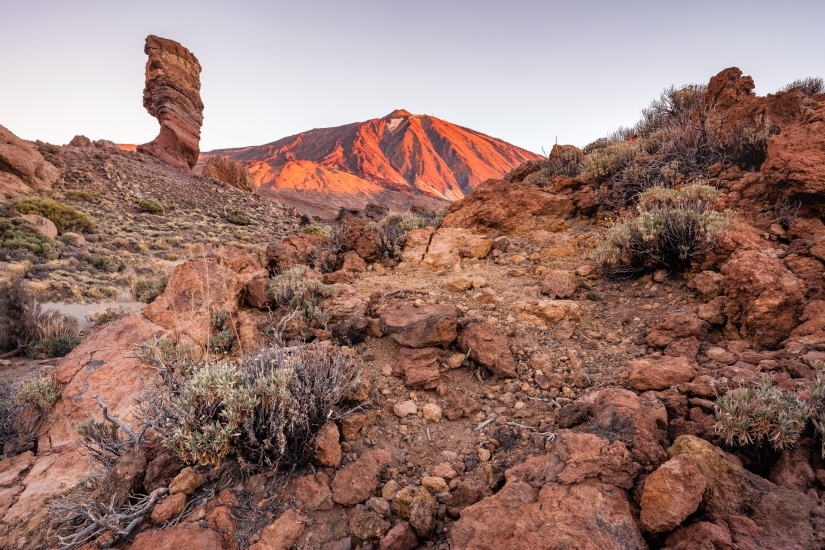
Perhaps the most famous view of Teide is from the rock formations found roughly in the middle of the caldera. It is hard to believe that there are times when one can be alone here in the silence of the volcanic desert, and even harder to believe that this is when the most interesting natural spectacle takes place. The landscape gradually brightens from the night's colour palette and then it happens - the slopes of the highest mountain turn red for a fleeting moment.
Roque Cinchado
Perhaps the most famous view of Teide is from the rock formations found roughly in the middle of the caldera. It is hard to believe that there are times when one can be alone here in the silence of the volcanic desert, and even harder to believe that this is when the most interesting natural spectacle takes place. The landscape gradually brightens from the night's colour palette and then it happens - the slopes of the highest mountain turn red for a fleeting moment.
- Camera used: SONY ILCE-7C
- Exposure time: 1/2 s
- Aperture: f/11.0
- Focal length: 20mm
- ISO: 100
- Date taken: Mar 7, 2022 08:21:05
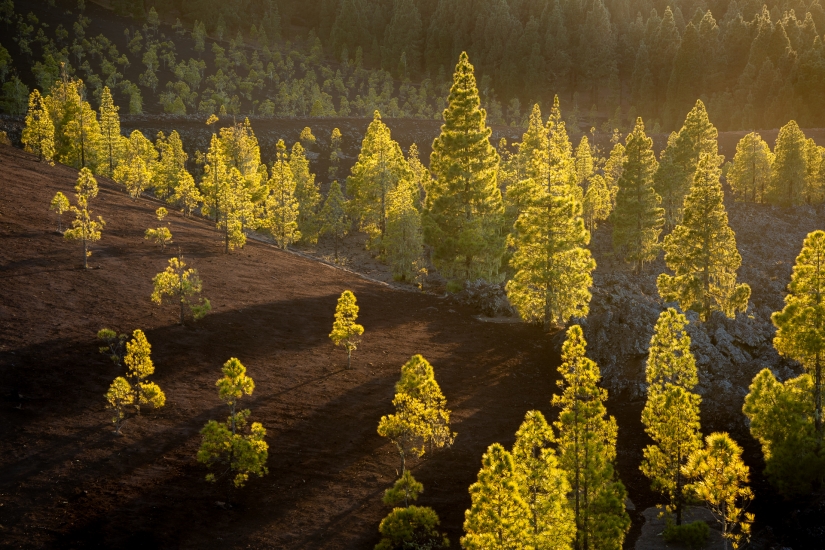
The large distances between the trees allow for an unusual spectacle in the morning and evening - the sun shining at a low angle lights up the trees like a candles and accentuates their yellowish hues. In a volcanic landscape made up of black-brown tuff, an unusually strong but natural contrast is created.
Evening torches
The large distances between the trees allow for an unusual spectacle in the morning and evening - the sun shining at a low angle lights up the trees like a candles and accentuates their yellowish hues. In a volcanic landscape made up of black-brown tuff, an unusually strong but natural contrast is created.
- Camera used: SONY ILCE-7C
- Exposure time: 1/80 s
- Aperture: f/5.6
- Focal length: 90mm
- ISO: 100
- Date taken: Mar 6, 2022 19:49:07
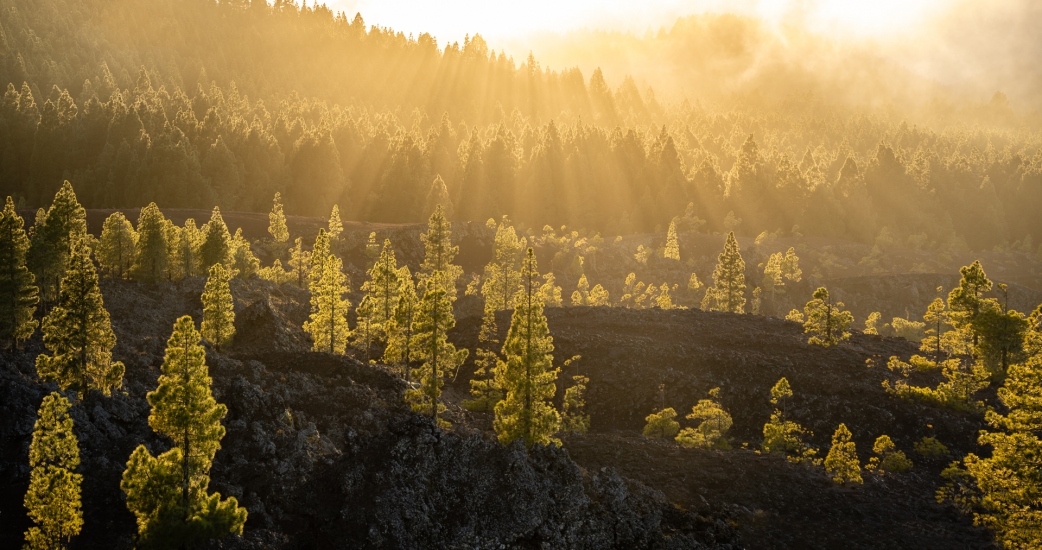
The surroundings of the Arenas Negras volcano are largely made up of rough tuff rocks from which yellowish pines grow fearlessly. The sun is dipping towards the horizon and a band of clouds is coming in from the sea. Thick enough to partially cover the landscape, but thin enough to let the sun's scattered rays pass through.
Sunrays over Arenas Negras
The surroundings of the Arenas Negras volcano are largely made up of rough tuff rocks from which yellowish pines grow fearlessly. The sun is dipping towards the horizon and a band of clouds is coming in from the sea. Thick enough to partially cover the landscape, but thin enough to let the sun's scattered rays pass through.
- Camera used: SONY ILCE-7C
- Exposure time: 1/160 s
- Aperture: f/5.6
- Focal length: 90mm
- ISO: 100
- Date taken: Mar 6, 2022 19:44:41
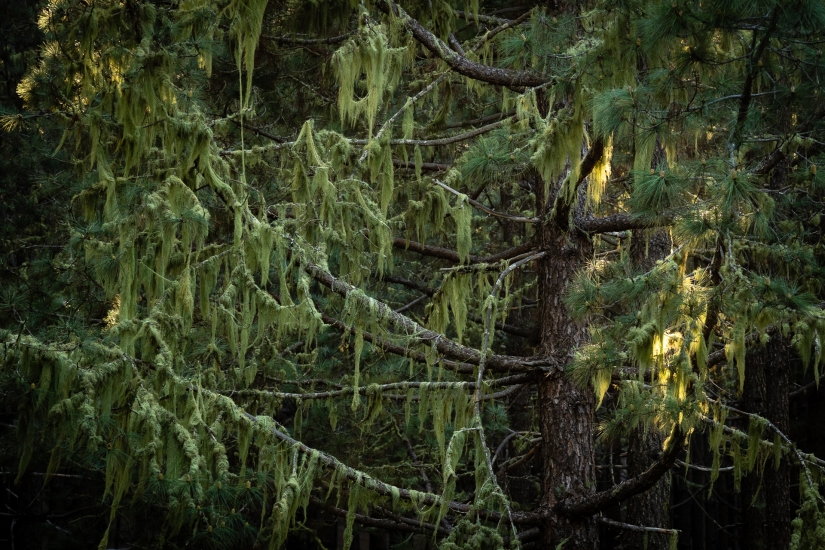
The pine trees in the Corona Forestal area are often covered with beards resembling grey-green moss. Some sections of the forest have an unusually mysterious and fairytale-like appearance due to the enormous amount of moss. In many cases it is hardly possible to distinguish the pine needles from overgrowing cover.
Spanish moss
The pine trees in the Corona Forestal area are often covered with beards resembling grey-green moss. Some sections of the forest have an unusually mysterious and fairytale-like appearance due to the enormous amount of moss. In many cases it is hardly possible to distinguish the pine needles from overgrowing cover.
- Camera used: SONY ILCE-7C
- Exposure time: 1/30 s
- Aperture: f/4.0
- Focal length: 90mm
- ISO: 100
- Date taken: Mar 6, 2022 18:51:18
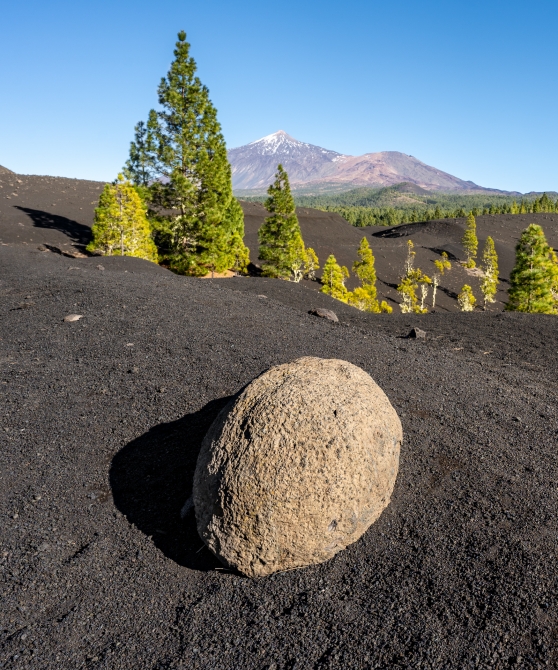
The black plains are interrupted only here and there by a group of solitary pine trees, whose shadows are slowly stretching. Teide looms on the horizon, visible from every corner of the island. The simple geometry of the place is broken only by a perfectly round boulder that doesn't seem to belong there at all.
Boulder in Arenas Negras
The black plains are interrupted only here and there by a group of solitary pine trees, whose shadows are slowly stretching. Teide looms on the horizon, visible from every corner of the island. The simple geometry of the place is broken only by a perfectly round boulder that doesn't seem to belong there at all.
- Camera used: SONY ILCE-7C
- Exposure time: 1/160 s
- Aperture: f/8.0
- Focal length: 20mm
- ISO: 100
- Date taken: Mar 6, 2022 17:59:51
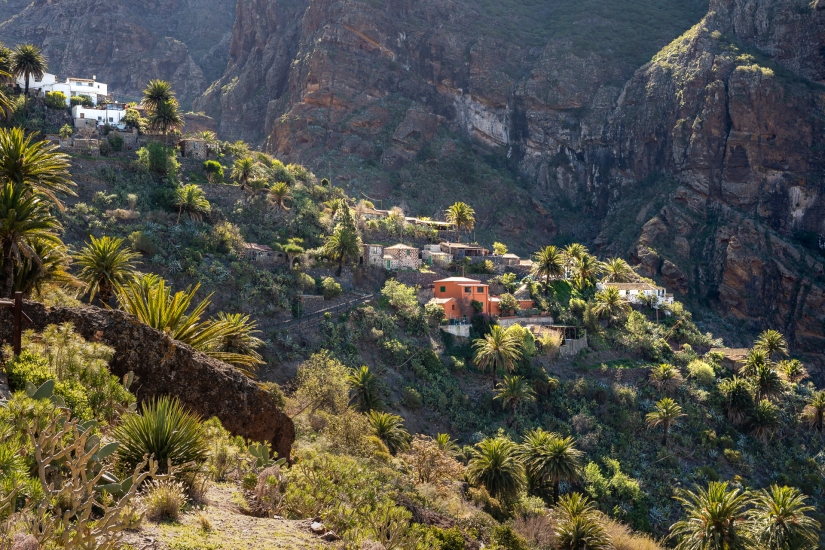
Several small settlements lie in the deep valley of the Teno mountain range. The most famous of these is probably Masca, heavily affected by massive tourism. It's hard to believe the heavy traffic that the winding road leading to its edge must be under. However, just arrive a little earlier, while the world is still sleepy and the sun has barely risen above the high rock faces, and a different, quite peaceful view will present itself.
Masca
Several small settlements lie in the deep valley of the Teno mountain range. The most famous of these is probably Masca, heavily affected by massive tourism. It's hard to believe the heavy traffic that the winding road leading to its edge must be under. However, just arrive a little earlier, while the world is still sleepy and the sun has barely risen above the high rock faces, and a different, quite peaceful view will present itself.
- Camera used: SONY ILCE-7C
- Exposure time: 1/50 s
- Aperture: f/8.0
- Focal length: 50mm
- ISO: 100
- Date taken: Mar 6, 2022 11:39:58
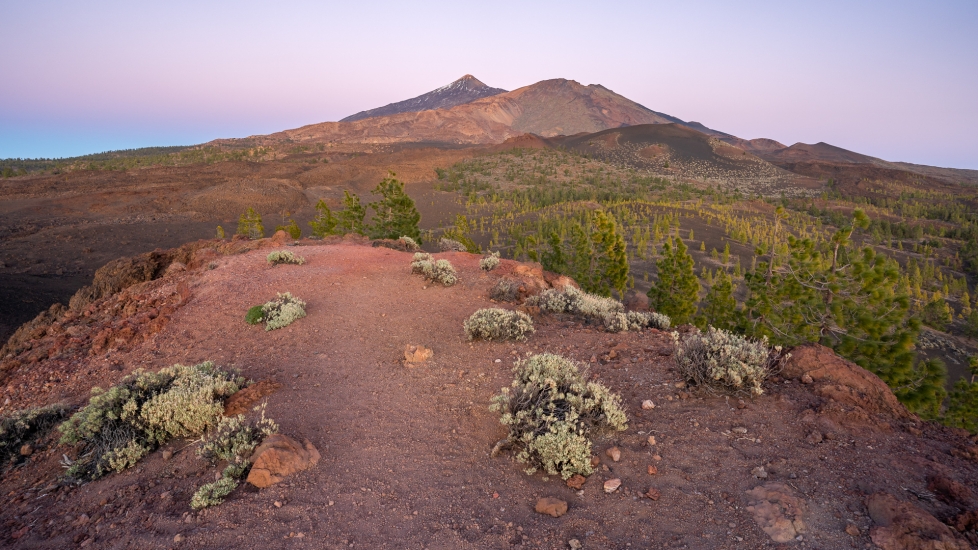
Sunset comes quickly to Tenerife, not surprisingly, as the island is much closer to the equator than mainland Europe. Pico de Teide first turns golden, then red, and soon everything is briefly bathed in pinkish tones. It is then that the natural colours of the seemingly barren volcanic landscape stand out the most. The view from Montaña de Samara.
Teide at dusk
Sunset comes quickly to Tenerife, not surprisingly, as the island is much closer to the equator than mainland Europe. Pico de Teide first turns golden, then red, and soon everything is briefly bathed in pinkish tones. It is then that the natural colours of the seemingly barren volcanic landscape stand out the most. The view from Montaña de Samara.
- Camera used: SONY ILCE-7C
- Exposure time: 1/10 s
- Aperture: f/5.6
- Focal length: 20mm
- ISO: 250
- Date taken: Mar 5, 2022 20:17:18
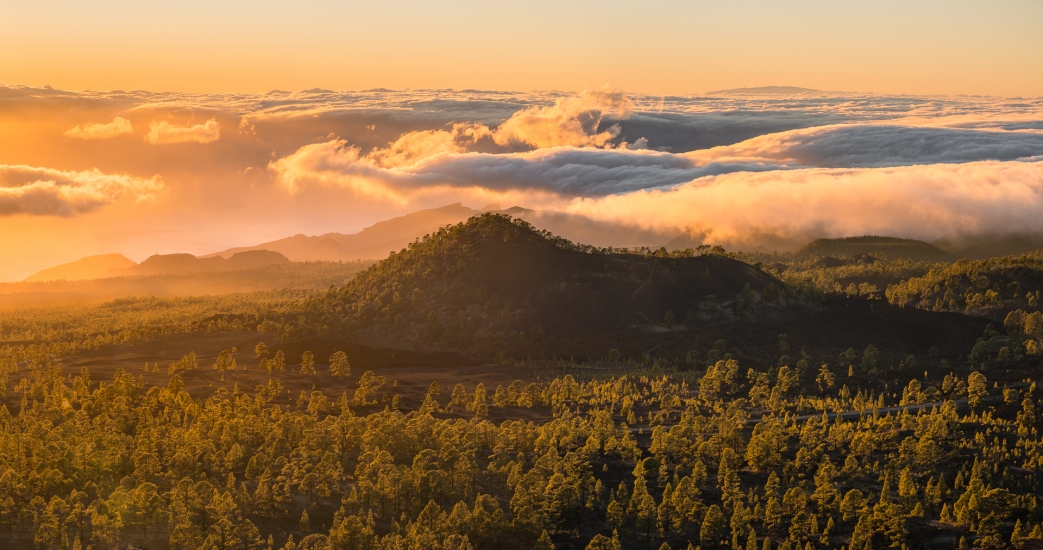
Almost every day in the late afternoon, clouds start to form over the edge of the island towards the sea. Just get a little higher and you can get a bird's eye view of the cloud cover. While the nearest forested peaks are high enough to stay above the clouds, the coastal cliffs only appear occasionally.
Coastal clouds
Almost every day in the late afternoon, clouds start to form over the edge of the island towards the sea. Just get a little higher and you can get a bird's eye view of the cloud cover. While the nearest forested peaks are high enough to stay above the clouds, the coastal cliffs only appear occasionally.
- Camera used: SONY ILCE-7C
- Exposure time: 1/250 s
- Aperture: f/8.0
- Focal length: 90mm
- ISO: 100
- Date taken: Mar 5, 2022 20:00:09

The jagged coastal cliffs peek out from behind the opposite peak of Montaña Cascajo, covered in a sparse stand of pine trees. The golden evening sun shines through their crowns. It's still quite warm, but the wind is strong and blows the volcanic sand.
Montaña Samara
The jagged coastal cliffs peek out from behind the opposite peak of Montaña Cascajo, covered in a sparse stand of pine trees. The golden evening sun shines through their crowns. It's still quite warm, but the wind is strong and blows the volcanic sand.
- Camera used: SONY ILCE-7C
- Exposure time: 1/100 s
- Aperture: f/8.0
- Focal length: 90mm
- ISO: 100
- Date taken: Mar 5, 2022 19:59:52